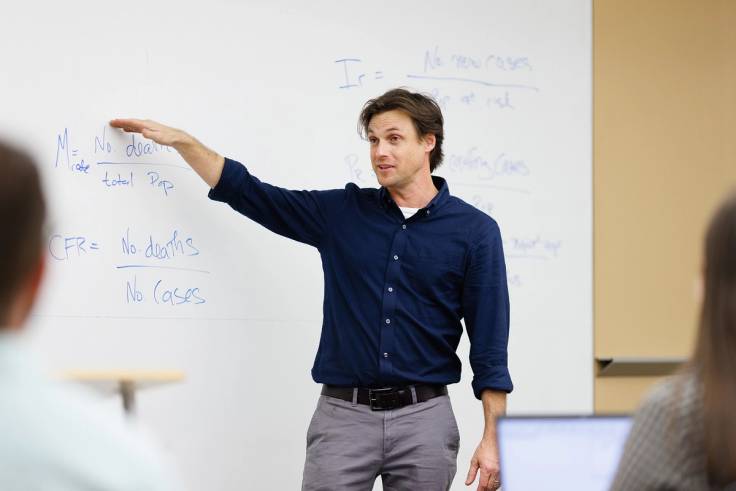
Community Health
Develop the knowledge, skills, and experience to address the most pressing health-related issues in your community.
From HIV and AIDS to food insecurity, housing disparities, and substance abuse, Central Florida provides a robust training ground to address concerns across the nation and around the globe. Rollins’ community health degree combines a foundational understanding of the root causes of public health issues with hands-on learning experiences to empower you to respond to the economic inequalities and social determinants impacting a range of populations, including at-risk kids and the LGBTQ+ and immigrant communities.
So whether you want to pursue graduate school or a career as an epidemiologist, community health worker, or public health researcher, you’ll be equipped with the know-how necessary to help those who need it most.
Why Rollins Professional Advancement
The personalized support, expert guidance, and time-tested know-how to finish your degree, transform your life, and advance your career

Designed to Fit Your Life
Our Professional Advancement programs are designed specifically for the busy lives of working adults like you.

Seamless Transfer & Guaranteed Admission
Get back on track to finish today with our seamless transfer process and guaranteed admission policy.

Ample Aid & Scholarships
Rollins offers the financial support you need to cross the finish line and unlock your earning potential.

Personalized Learning Environment
With an average class size of 14, our personalized learning environment is designed for individualized attention whenever you need it.
Top 3 Reasons to Finish Your Community Health Degree at Rollins
An Engaged Community
Learn about the issues impacting Central Florida while actively serving the community through our community engagement-designated courses and a range of service-learning projects.
Hands-on Learning
Through internships and your senior capstone project, you’ll gain valuable first-hand experience partnering with local nonprofits ranging from Hope & Help and the Center Orlando to the Farm Workers Association of Florida and Second Harvest Food Bank.
Research that Matters
You’ll have the opportunity to work alongside your professors to conduct original research—and publish it in peer-reviewed journals—as part of Rollins’ Student-Faculty Collaborative Scholarship program.
Interested in the Community and Public Health Program at Rollins?
Sign up to receive our guide to completing your degree at Rollins.

Expert Faculty
Our community health faculty are more than dedicated teachers. They’re leading experts who are actively engaged in the community. As a result, you’ll not only learn about health disparities, infectious diseases, the healthcare industry, and health communication from teachers who are widely respected and well published. But you’ll also have the benefit of their deep connections with local agencies, nonprofits, and government officials to help best position you to secure a position in your field of choice after you graduate.

Did You Know?
The median salary for epidemiologists is more than $78,000 per year. Learn more about how finishing your community health degree at Rollins can help advance your career and unlock your earning potential.
Streamlined Admission
No application fee. No standardized tests required. No more excuses.
